 | What is Sleep... and why do we do it? |  |
 | What is Sleep... and why do we do it? |  |
 We spend about 8 hours/day, 56 hours/week, 240 hours/month and 2,920
hours/year doing it...that's right...SLEEPING. We apparently spend one
third of our lives doing nothing. But is sleep really doing nothing? It
looks like it...our eyes are closed, our muscles are relaxed, our
breathing is regular, and we do not respond to sound or light. If you
take a look at what is happening inside of your brain, however, you will
find quite a different situation - the brain is very active. You are
doing something!
We spend about 8 hours/day, 56 hours/week, 240 hours/month and 2,920
hours/year doing it...that's right...SLEEPING. We apparently spend one
third of our lives doing nothing. But is sleep really doing nothing? It
looks like it...our eyes are closed, our muscles are relaxed, our
breathing is regular, and we do not respond to sound or light. If you
take a look at what is happening inside of your brain, however, you will
find quite a different situation - the brain is very active. You are
doing something!
|
Sleep follows a regular cycle each night. The EEG pattern changes in a
predictable way several times during a single period of sleep. There are
two basic forms of sleep: rapid
eye movement (REM) sleep and non-rapid REM (NREM) sleep. (REM sleep is sometimes called "paradoxical sleep.") Infants
spend about 50% of their sleep time in NREM and 50% in REM sleep. Adults
spend about 20% of their sleep time in REM and 80% in NREM sleep.
Elderly people spend less than 15% of their sleep time in REM
sleep. |
|
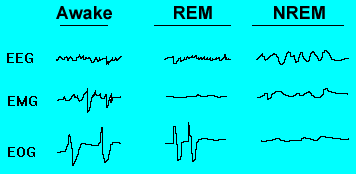 |
These lines represent the EEG (electroencephalogram) which shows a record of brain activity; the EMG (electromyogram) shows muscle activity; the EOG (electroculogram) shows eye movements. Look at the differences in the EEG, EMG and EOG during waking, REM sleep (Rapid Eye Movement Sleep) and NREM sleep. |
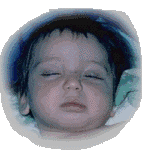 REM Sleep
| Most dreaming occurs during REM sleep. During REM sleep, a
person's eyes move back and forth rapidly. Sleep researchers discovered
this when they woke people up during REM sleep. Often when people in REM
sleep wake up, they say that they were just dreaming. The EEG pattern
during REM sleep is similar to the EEG pattern when people are awake.
However, the muscle activity is very quiet during REM sleep. Muscles are
inactive to prevent us from acting out our dreams. This also means that
sleepwalkers are not in REM sleep and are not acting out their dreams. NREM sleep is actually 4 different stages of sleep (Stage 1, Stage 2, Stage 3 and Stage 4) with different EEG patterns. Stages 3 and 4 are sometimes called slow wave sleep.
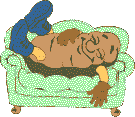
|
 While we are
asleep, our brains are on a bit of a "roller-coaster" through
different stages of sleep. As we drift off to sleep, we first enter stage
1 sleep. After a few minutes, the EEG changes to stage 2 sleep, then stage
3 sleep, then stage 4 sleep. Then it's back up again: stage 3, stage 2,
then a period of REM sleep...then it's back down again, and back up again,
and down again...you get the picture. As shown in the figure below, in an
8 hour period of sleep, the brain cycles through these stages about 4-5
times. While we are
asleep, our brains are on a bit of a "roller-coaster" through
different stages of sleep. As we drift off to sleep, we first enter stage
1 sleep. After a few minutes, the EEG changes to stage 2 sleep, then stage
3 sleep, then stage 4 sleep. Then it's back up again: stage 3, stage 2,
then a period of REM sleep...then it's back down again, and back up again,
and down again...you get the picture. As shown in the figure below, in an
8 hour period of sleep, the brain cycles through these stages about 4-5
times.
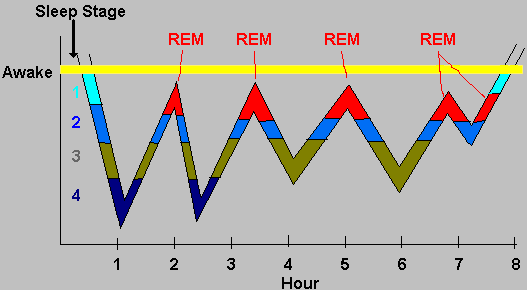 |
| Age-related changes in total amount of sleep and REM Sleep | |
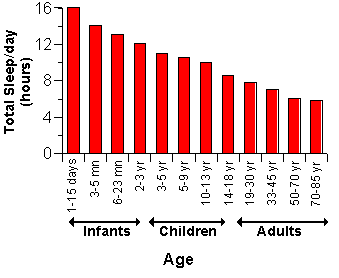 |
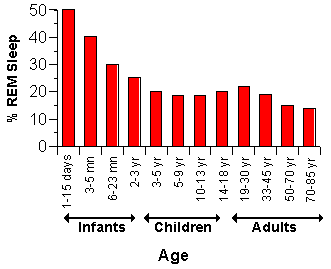 |
| Data from Roffwarg et al., Ontogenetic development of the human sleep-dream cycle, Science, 152:604-619, 1966 | |
| Sleep patterns change as people age. As shown in the two graphs above, infants spend more time sleeping and spend a greater percentage of sleep in REM sleep compared with the times of older children and adults. For example, newborn babies sleep about 16 hours per day and spend about 50% of that time in REM sleep. Older people (50-85 years old) sleep only 5.75-6 hours per day and spend 13.8-15% of that time in REM sleep. | |
As you might expect, as children grow,
they spend less time sleeping during the day. The graph below illustrates
how nighttime and daytime sleep time changes with age.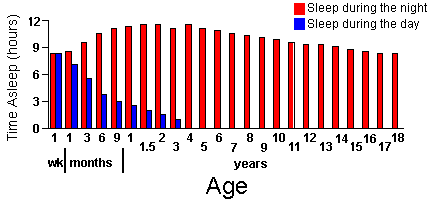 Data from Howard, B.J. and Wong, J. Sleep disorders, Pediatrics in Review, 22:327-341, 2001. | |

Did you
know? Did you ever think
about how much you sleep and dream? The "average" human sleeps about 8
hours every day. That's one third of your life!
In other words, you sleep for about 122 days every year. A 75 year old
person would have spent a total of about 25 years asleep. There is a wide
range in the amount of time different animals
spend sleeping. Did you ever think
about how much you sleep and dream? The "average" human sleeps about 8
hours every day. That's one third of your life!
In other words, you sleep for about 122 days every year. A 75 year old
person would have spent a total of about 25 years asleep. There is a wide
range in the amount of time different animals
spend sleeping.
|
Why Sleep?Why sleep at all? It seems like a big waste of time. Think of all you could be doing if you did not sleep. Nevertheless, sleep appears to be necessary. There is a continuing debate about why we sleep. Why do most animals sleep? How much sleep is required?
Most "higher" animals appear to sleep during
some portion of the day and/or night. - they are quiet; they rest; they
do not move. No one knows for sure why we sleep, but here are 2 basic theories:
Sleep as a Restorative Process This theory of sleep suggests that
sleep helps the body recover from all the work it did while an animal was
awake. Experiments have shown that the more physical exercise an animal
does, the more NREM an animal will have. Also, if people are deprived of
NREM by waking them up each time they get to stage 4 sleep, then they
complain of being physically tired. If people are deprived of REM sleep
by waking them up each time the have REM type EEG patterns, they can get
anxious and irritable. If animals are deprived of REM for several days
and then allowed to get an undisturbed period of sleep, animals will go
into "REM rebound" - this is when REM periods of sleep will happen more
often and for a longer time than normal. Sleep has also been thought to be
important for memory and learning. This theory of sleep suggests that
sleep helps the body recover from all the work it did while an animal was
awake. Experiments have shown that the more physical exercise an animal
does, the more NREM an animal will have. Also, if people are deprived of
NREM by waking them up each time they get to stage 4 sleep, then they
complain of being physically tired. If people are deprived of REM sleep
by waking them up each time the have REM type EEG patterns, they can get
anxious and irritable. If animals are deprived of REM for several days
and then allowed to get an undisturbed period of sleep, animals will go
into "REM rebound" - this is when REM periods of sleep will happen more
often and for a longer time than normal. Sleep has also been thought to be
important for memory and learning.
Sleep as an Adaptive ProcessSleep may have developed because of a need of animals to protect themselves. For example, some animals search for food and water during the day because it is easier to see when the sun is out. When it is dark, it is best for these animals to save energy, avoid getting eaten, and avoid falling off a cliff that they cannot see. It is interesting to note which animals sleep the most and which sleep the least. In general, animals that serve as food for other animals sleep the least.
|
 |
Highlights from the National Sleep Foundation's 2020
Sleep in America poll of 1,011 people:
|
Did you know? |
|
 | Try these sleep experiments on your own. | Do you like interactive word search puzzles?
Make sure your browser is "java-enabled" and try this one:
|

| For more information about sleep, see: |
They said it! | "Early to bed, and early to rise, makes a man healthy, wealthy, and wise." --- Benjamin Franklin, 1758 (in Poor Richard's Almanack)
"The woods are lovely, dark and deep.
"Sleep is better than medicine."
"The beginning of health is sleep."
"In sleep we are all equal."
"Disease and sleep keep far apart."
"Dreaming of eating will not satisfy the hungry."
"Sleep is an acquired habit. Cells don't sleep. Fish swim in the water all
night. Even a horse doesn't sleep. A man doesn't need any sleep."
"I never use an alarm clock. I can
hardly wait until five a.m. In the army I always woke before reveille. I
hate sleeping. It wastes time." |
| BACK TO: | Exploring the Nervous System | Table of Contents |
![[email]](./gif/menue.gif) Send E-mail |
 Get Newsletter |
 Search Pages |
 Donate to Neuroscience for Kids |